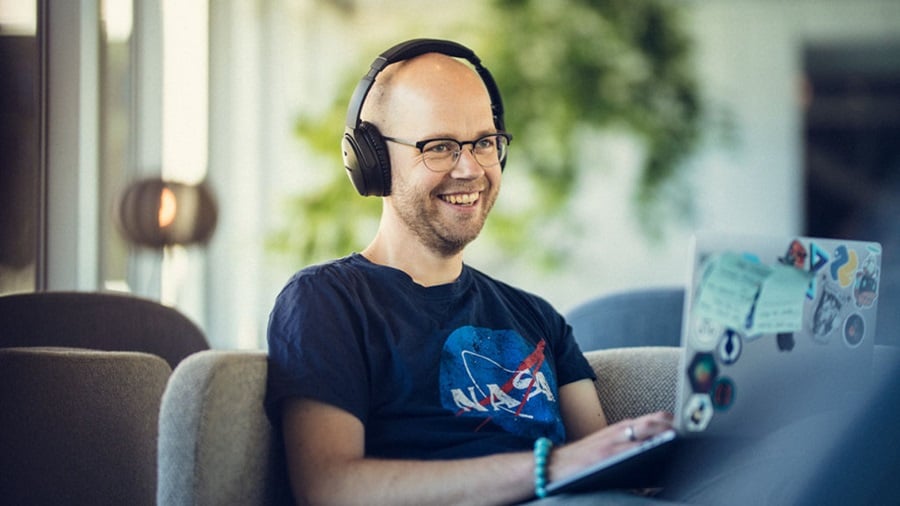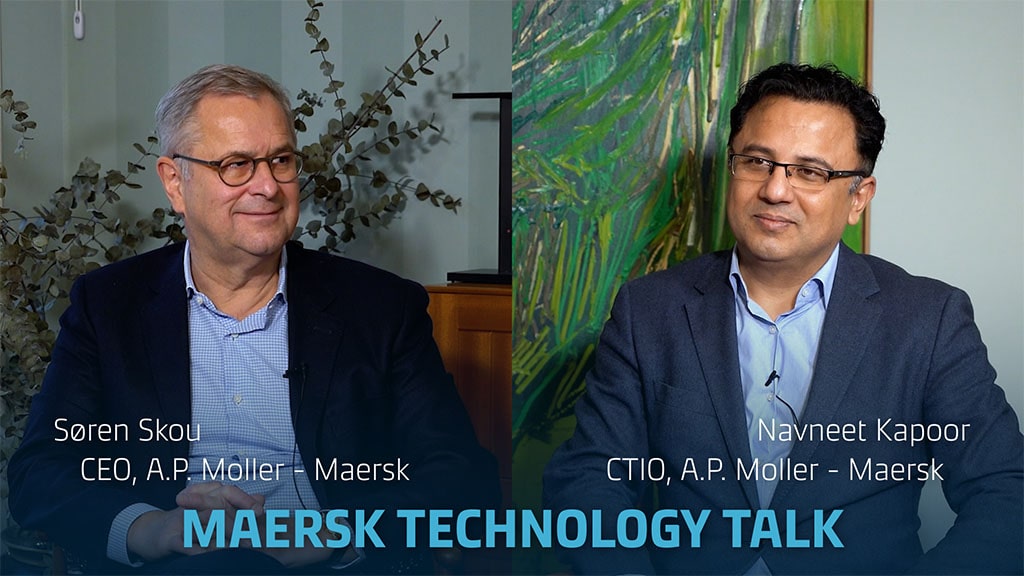BEYOND THE BUZZ | Innovation has the potential to change how global trade works. To unlock it, A.P. Moller - Maersk is undergoing a digital and cultural transformation that will make it easier to bring grassroot ideas to life.
Often used, but so rarely achieved, ‘innovation’ remains a popular buzzword with big tech and the corporate elite, as well as the youngest of startups. Few would claim that the concept has become irrelevant, while many may argue that the true meaning of innovation could get lost if not used carefully and put into context.
To avoid this trap and get a very tangible impression of what grassroots innovation can do, Maersk recently organised its first ever global hackathon. A well-known concept in organisations and startup communities to develop new ideas at high pace, Maersk’s own version resulted in hundreds of prototypes, small hacks and proof of concepts from 671 participants across 57 countries - in just three weeks.
“The hackathon really captured people’s imaginations, and the creativity and collaboration were excellent," says Paw Martins, Head of Technology Enterprise Architecture, and organiser of the event.
In the end, three finalists received sponsorship to develop their projects, but none of the good ideas will go to waste. Thanks to the hackathon, Maersk now has a company-wide innovation backlog of 235 potential ideas from both sea and shore.
The winning ideas offered new ways to improve the customer experience and added revenue streams. One tool analyses data to identify cross-selling opportunities for landside products to ocean customers, so they can benefit from a true, end-to-end service, while others engineered ways to automate quotation and claims handling.
"The event clearly demonstrates the tremendous enthusiasm for innovation from all parts of the business. Now, we need to make sure that we keep nurturing and channeling these efforts into real opportunities that could potentially transform our business and the wider industry,” adds Paw Martins.
The potential
Technology is fast becoming the common enabler in the transformation of global transport and logistics. For long, the industry has been trailing more progressive sectors such as ecommerce and travel where tech giants Amazon, Über and Hotels.com have disrupted entire industries by enhancing the customer experience through digital technology.
In recent years, the digitalisation of global supply chains has started to catch up. Customers want simple solutions with high transparency on price, instant confirmations on bookings and track & trace functionality, similar to what they're used to when they're buying a book or a plane ticket.
Maersk has taken the lead in the industry's response to new demands with the introduction of digital breakthroughs such as Maersk Spot that offers an instant price and loading guarantee for short-term customers.
“Not long ago, we thought about technology as the engine room that keeps everything going. Now, technology is really an integrated part of our strategy and how we're building a competitive advantage,” says former Maersk CEO Søren Skou.
Maersk itself is also undergoing a massive technology transformation. On the one hand by becoming truly data driven in the way it utilises data from vessels, ports and containers to improve visibility for customers in near real-time, e.g. on Maersk.com, while on the other hand becoming faster and more efficient as an organisation through standardised processes, a common approach to data and modernisation of its technology estate.
Digital innovation is also creating completely new value and potential revenue streams for the industry. One example is Maersk’s ambitious partnership with IBM on the neutral, blockchain-enabled platform, TradeLens. It aims to eliminate the heavy amounts of time-consuming paperwork that goes into every shipment today by inviting all industry players to interact and exchange information in one shared, digital, and secure space.
Engineering culture
These examples all indicate how new technology has the potential to both transform the industry, how it engages with customers, and how a company is run.
But how does a company like Maersk that is more than 100 years old and has grown into a big, global and at times bureaucratic operation make sure that it embraces the entrepreneurial energy among its more than 80,000 employees?
We believe that if you have a mechanism to channel the right conversations around innovation, we can enable ideas to be fleshed up, do something about it and make it part of our mainstream work. It's hugely powerful.

“I have had this idea in the drawer for more than a year,” said one hackathon participant.
Today, the focus is mainly on investing in startups through Maersk Growth and fast tracking the uptake of relevant startsups with Ocean Pro. To provide the rocket fuel that will make the company's digital transformation take off, the organisation is exploring several ways to mature and sustain innovation as an enduring part of its operating model and culture.

The CTIO, who is responsible for the digital transformation, believes this is a way to create more innovation in the company because it exposes the young and creative engineers directly to top management.
“When we see a promising idea that we really think has potential and can scale, then we can also make things happen much faster,” Kapoor adds.
Remove roadblocks
In addition to the organisational changes, fostering more grassroots innovation also requires a cultural shift, namely for leadership. Successful transformations require speed and agility, but many of them get stuck because the organisational inertia pulls them back.
According to Navneet Kapoor, the role of leaders is to help teams remove roadblocks. They should let engineers and relevant people in the business take the decisions that create the most customer value and move the company forward, giving up the command and control that many have been used to.
The organisation has defined a set of cultural behaviours that should help drive these new ways of working. ‘Agility’ has been pinpointed as one of the desired core enablers that will help cultivate more innovation by encouraging employees to experiment, fail fast, learn, and get things done.
For this new behaviour to really kick in as more than a lofty intention that is more commonly used to describe startups with quick decision making, Maersk is also focusing on increasing its diversity of thought by attracting a new breed of talents from the widest possible pool.
We have very complex problems to solve that require creative minds to come together. We also know that top talents want a place where they can have an impact, add value, and where they are empowered to do the things, they want. So, we're building a culture that encourages open conversation, collaboration, fact decisions and co-creation.
Maersk may not have invented the container in the 1950s, but the entrepreneurial spirit of its people has made the company play a major role in making containerised trade cheaper, simpler, and more accessible across the world.
How its role in global trade will develop in the years to come largely depends on its ability to foster, nurture and harness grassroots innovation at speed.
Author:
无论您需要什么,我们都可以随时为您提供帮助
I agree to receive logistics related news and marketing updates by email, phone, messaging services (e.g. WhatsApp) and other digital platforms, including but not limited to social media (e.g., LinkedIn) from A. P. Moller-Maersk and its affiliated companies (see latest company overview). I understand that I can opt out of such Maersk communications at any time by clicking the unsubscribe link. To see how we use your personal data, please read our Privacy Notification.
By completing this form, you confirm that you agree to the use of your personal data by Maersk as described in our Privacy Notification.


